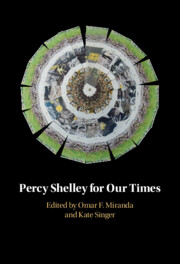Book contents
- Percy Shelley for Our Times
- Reviews
- Percy Shelley for Our Times
- Copyright page
- Contents
- Notes on Contributors
- Acknowledgments
- Abbreviations
- Introduction
- 1 Shelley, Treaty-Making, and Indigenous Poetry
- 2 Waiting for the Revolution
- 3 “A Chamæleonic Race”
- 4 Dream Defenders and the Inside Songs
- 5 Radical Suffering
- 6 Loathsome Sympathy
- 7 Hopeless Romanticism
- 8 Percy Shelley’s Sad Exile
- 9 Shelley in the Overgrowth
- 10 Creatrix Witches, Nonbinary Creatures, and Shelleyan Transmedia
- 11 Action at a Distance
- 12 Educating the Imagination/Defending Shelley Defending
- Further Reading
- Index
2 - Waiting for the Revolution
Age, Debility, and Disability in The Triumph of Life
Published online by Cambridge University Press: 07 March 2024
- Percy Shelley for Our Times
- Reviews
- Percy Shelley for Our Times
- Copyright page
- Contents
- Notes on Contributors
- Acknowledgments
- Abbreviations
- Introduction
- 1 Shelley, Treaty-Making, and Indigenous Poetry
- 2 Waiting for the Revolution
- 3 “A Chamæleonic Race”
- 4 Dream Defenders and the Inside Songs
- 5 Radical Suffering
- 6 Loathsome Sympathy
- 7 Hopeless Romanticism
- 8 Percy Shelley’s Sad Exile
- 9 Shelley in the Overgrowth
- 10 Creatrix Witches, Nonbinary Creatures, and Shelleyan Transmedia
- 11 Action at a Distance
- 12 Educating the Imagination/Defending Shelley Defending
- Further Reading
- Index
Summary
Percy Shelley has been a young man’s poet. Ever since Matthew Arnold dubbed his predecessor a “beautiful and ineffectual angel, beating in the void his luminous wings in vain,” poets and critics would pit Shelley’s youthful radicalism against their own grown-up poetics and politics. T. S. Eliot would, for example, rhapsodize about his teenage years misspent idolizing the Romantic poet just to articulate his newfound modernism. Two hundred years later, we might amend the cliché to say that Percy Shelley is a young woman’s poet. His is the social media–savvy voice of Alexandria Ocasio-Cortez, dreaming of a Green New Deal and the systematic dismantling of institutional inequities; Arnold’s the establishment voice of Nancy Pelosi, chastising the beat of ineffectual wings. Because of this generational reading of Shelley, his last unfinished poem, The Triumph of Life, frequently sounds like a pessimistic turn from Promethean idealism toward Byronic cynicism, like youthful radicalism disappointed by unfulfilled promises. This chapter argues instead that the poem’s embodied contingencies of age, debility, and disability shape rather than frustrate Shelley’s developing idealism.
- Type
- Chapter
- Information
- Percy Shelley for Our Times , pp. 43 - 62Publisher: Cambridge University PressPrint publication year: 2024



